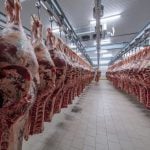Trump administration keen on managed trade system based on tariffs
While U.S. officials may say that free trade isn’t dead, MarketsFarm analyst Bruce Burnett respectfully disagrees.
The Trump administration’s recent moves have effectively taken the United States out of any type of free trade agreement, Burnett wrote this week. The U.S. appears intent on replacing free trade with a system based on managed trade. It’s doing this by imposing both general and specific tariffs.
The U.S. is increasingly linking reduction in tariffs to foreign purchases. For example, Bangladesh has agreed to annually purchase 700,000 tonnes of U.S. wheat for the next five years. Bangladesh has historically bought very little American wheat. It has, however, typically bought 1.2 million tonnes of Canadian wheat per year.
Burnett said the managed trade of highly-subsidized American crops could have a large impact on Canadian farmers.
Managing bovine tuberculosis means keeping livestock, wildlife apart
A recent case of bovine tuberculosis in a Manitoba dairy cow illustrates the need to keep cattle away from wildlife like deer, elk and wild pigs.
While there’s no word yet on where the cow contracted the disease, wildlife have typically been considered a major reservoir for bovine TB. Elk have been the focus in Manitoba, but University of Saskatchewan researcher Ryan Brook suggested that whitetail deer and wild pigs shouldn’t be overlooked. Whitetail deer are ubiquitous in Manitoba, and invasive wild pigs are an ongoing problem.
Brook offered tips on how to keep wildlife away from feed, thus reducing contact with cattle. He suggested modifying bale grazing practices, for instance choosing spots with better-developed fences, or bale grazing closer to home.
High, barrier fences can also keep wildlife from eating and damaging hay. Brook said he’s seen high fencing, coupled with heavy-duty page wire, keep problem elk out of hayland and discouraging them from returning.
Pigweed herbicide Convintro approved in Canada
Newly introduced Convintro herbicide could soon be an option for control of herbicide-resistant pigweeds.
Bayer will begin by marketing the product as a corn herbicide, but has also secured label approval for use on soybeans said Adam Pfeffer, a technical product lead with the company.
Diflufenican, the active ingredient in the herbicide, has been used for years on cereals in Europe and Australia. It works through selective contact, and also as a residual. This should help it tackle glyphosate-resistant pigweeds – a problem just beginning to emerge in Canada.
The group 27 and Group 12 formulation should be commercialized later this year.








